Many household items may be harmful to you, your family, animals, and the environment if disposed of improperly. Never put hazardous waste in your trash, leave curbside for collection or pour down the drain or storm sewer.
Landfilling the following materials is prohibited in the State of Florida:
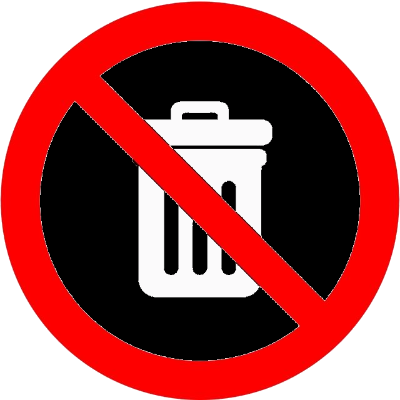 Car batteries
Car batteries- Fluorescent bulbs
- Liquid waste
- Medical waste
- Mercury
- Motor oil
- NiCad batteries
- Tires
- White goods (Appliances)
- Yard waste
Household Hazardous Waste Disposal & Recycling Facilities
For the proper disposal and recycling of household hazardous waste, residents in the City of Gainesville should take these materials to one of the Alachua County facilities that are equipped and trained to manage this type of material. For more information visit online at Alachua County’s Hazardous Waste Collection or call (352) 334-0440.
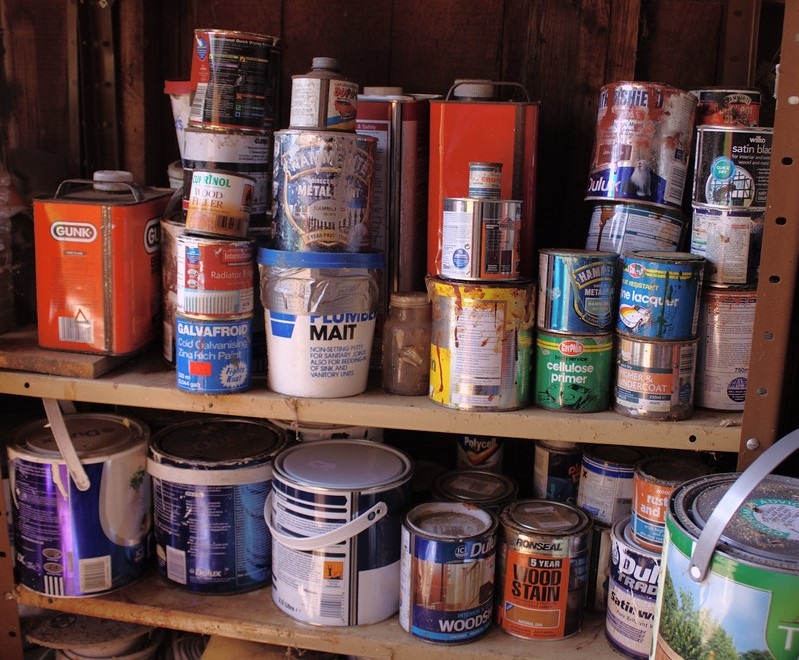 Having to store gallons of leftover paint in your garage or shed can take up valuable storage space and even be a potential hazard waiting to happen for you, your family, and the environment. Some paints contain heavy metals like mercury or lead, and some paints are also flammable. Below are some tips for avoiding the storing of paint waste and making yours a healthier home:
Having to store gallons of leftover paint in your garage or shed can take up valuable storage space and even be a potential hazard waiting to happen for you, your family, and the environment. Some paints contain heavy metals like mercury or lead, and some paints are also flammable. Below are some tips for avoiding the storing of paint waste and making yours a healthier home:
Get it Right (REDUCE)
A first step in reducing paint waste is making sure you get the correct paint color and amount from the beginning. Most paint retail suppliers offer small sample amounts of color mixes that you can take home and test out on your walls before purchasing larger quantities. Consider using a free online Paint Calculator to get the right amount of paint you’ll need, like this one from Benjamin Moore, or try another one from your favorite paint supplier. Generally, about one gallon of paint will cover 400 square feet of smooth surface. Buying only what you need will save you time and money.
Keep it Tight (REUSE)
Properly storing leftover paint will extend the life of your paint so that it can be reused later on for touchups or on other projects. Keep a tight seal on paint cans by wiping the rim clean before putting the lid back on and carefully tap down the lid without bending or damaging it or the can. Paint should be stored in a dry, cool (but not too cold), dark place that is not damp, outdoors, or in direct sunlight. If you end up with more paint than you think you’ll be able to use, offer the leftover paint to family, friends, or neighbors. Consider donating larger quantities of leftover paint that is still in good condition to churches, schools, or other charities for community housing projects.
Recycle the Rest (RECYCLE).
Gainesville and Alachua County residents can drop-off almost any type of interior or exterior paint for recycling at the Alachua County Household Hazardous Waste Collection Center, as well as at any of the five Alachua County Rural Collection Centers. Before dropping off your paint, please be sure that the cans are marked with what material is inside and that all lids are closed up tightly. Paints accepted for recycling include latex, oil-based, enamel, acrylic, decking paint, primers, stains, varnishes, waterproofing paint, rust preventatives, aerosol cans. Paint-related materials, such as paint thinners and solvents, are also accepted for recycling at the County drop-off sites. Dry, empty cans of paint can be disposed of in with your regular trash.
For more information on properly disposing of Household Hazardous Waste, please contact the Alachua County Environmental Protection Department at 352-334-0440.
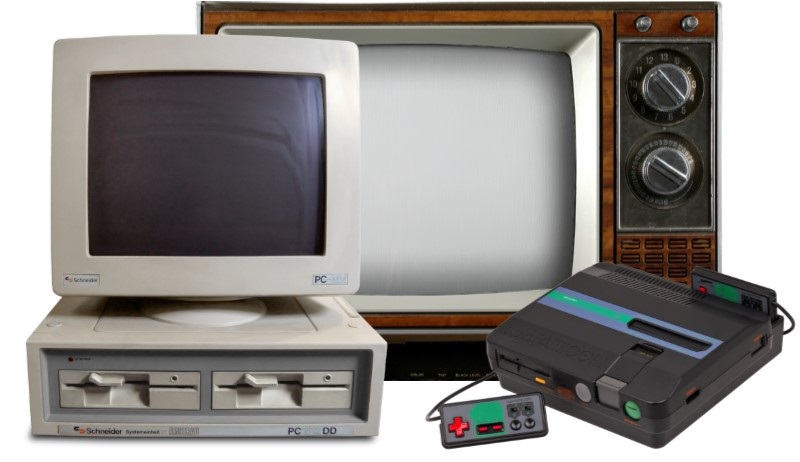 We all have them, and they are gradually taking up more and more storage space around our homes – Old, Unwanted Electronics. The life cycle of usable electronic devices seems to be getting shorter and shorter every year. When your electronic devices reach their end of life, be sure to properly recycle them, as many electronic devices contain a variety of substances that are potentially harmful to our health and environment if tossed into landfills.
We all have them, and they are gradually taking up more and more storage space around our homes – Old, Unwanted Electronics. The life cycle of usable electronic devices seems to be getting shorter and shorter every year. When your electronic devices reach their end of life, be sure to properly recycle them, as many electronic devices contain a variety of substances that are potentially harmful to our health and environment if tossed into landfills.
There are several options currently available to City of Gainesville residents for properly recycling old, unwanted electronics.
Drop-off Locations
There is no fee for Gainesville and Alachua County residents to bring electronics for recycling to the Alachua County Household Hazardous Waste Collection Center or at any of the five Alachua County Rural Collection Centers.
Curbside Collection
There is no additional fee for residents in homes with City Solid Waste Services to schedule an appointment to collect electronic items for recycling. For a list of accepted materials for curbside collection and to set up your electronics collection appointment, please visit Electronic Recycling Collection.
Retail Stores
Some electronic stores and retailers will accept electronics for recycling. For example, Best Buy accepts a large number of small electronics for recycling, such as computers, tablets, and mobile phones. If items are not specifically listed by a store, please be sure to call ahead to confirm what items they accept for recycling and if there is a fee.
Batteries power every cordless electronic device we have in our home, and our demand for more unplugged power is increasingly growing. While advances in battery technology are seemingly made daily to meet our need for more powerful batteries that are cheaper and lighter, there’s a limited supply of many of the elements used to make new batteries. It is critically important that we do our part and recycle our used rechargeable batteries to prevent future battery shortages.
Single-use Household Batteries
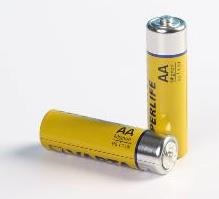 Standard-sized batteries (AA, AAA, C, D, and 9-volt) are commonly used to power portable radios, flashlights, and small toys. These dry-cell alkaline batteries are also referred to as “single-use” or “disposable” batteries because they have limited recycling potential. While these batteries contain small amounts of zinc and other metals, they are no longer considered hazardous since manufacturers stopped putting mercury in them in the mid-1990s. Alkaline or any other type of battery should never be placed in your recycle bins at home; however, they can be dropped off for recycling at the Alachua County Household Hazardous Waste Collection Center or at any of the five Alachua County Rural Collection Centers. The smart move is to get a set of new standard-sized rechargeable batteries and save yourself money in the long run.
Standard-sized batteries (AA, AAA, C, D, and 9-volt) are commonly used to power portable radios, flashlights, and small toys. These dry-cell alkaline batteries are also referred to as “single-use” or “disposable” batteries because they have limited recycling potential. While these batteries contain small amounts of zinc and other metals, they are no longer considered hazardous since manufacturers stopped putting mercury in them in the mid-1990s. Alkaline or any other type of battery should never be placed in your recycle bins at home; however, they can be dropped off for recycling at the Alachua County Household Hazardous Waste Collection Center or at any of the five Alachua County Rural Collection Centers. The smart move is to get a set of new standard-sized rechargeable batteries and save yourself money in the long run.
Rechargeable Batteries
Many small consumer products such as cell phones, cordless tools, computer tablets, and electric toothbrushes are powered using rechargeable batteries. Lithium-ion (Li-ion) rechargeable batteries have mostly replaced their Nickle-cadmium (Ni-Cd) rechargeable battery predecessors. The Li-ion chargeable batteries are lighter and hold a longer charge. Rechargeable batteries contain valuable metals such as cobalt, nickel, and lithium and should be recycled at their end-of-life.
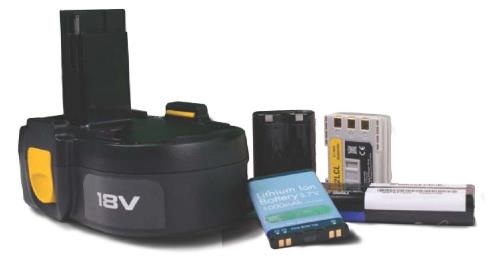 There are several options available for recycling your rechargeable batteries. Most cellular phone stores, large retail stores, and hardware stores have drop-off containers for you to drop off your rechargeable batteries for recycling. You can also visit Call2Recycle.org to find a batteries recycling drop-off location near you. For a list of other local battery recycling options, search the Zero Waste Wizard.
There are several options available for recycling your rechargeable batteries. Most cellular phone stores, large retail stores, and hardware stores have drop-off containers for you to drop off your rechargeable batteries for recycling. You can also visit Call2Recycle.org to find a batteries recycling drop-off location near you. For a list of other local battery recycling options, search the Zero Waste Wizard.